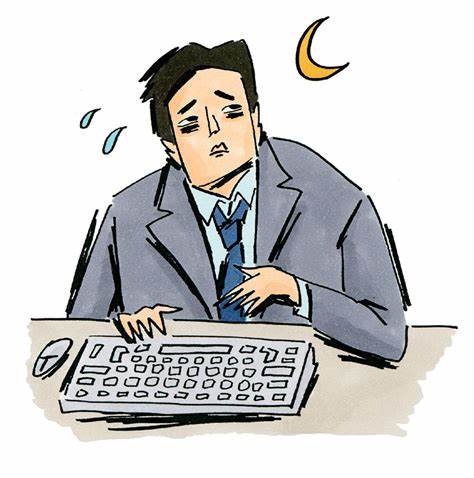Protesting long hours
“996”工作制,是蜜糖還是毒藥?
Many people dream of becoming a programmer for a major tech company, as such work can secure a high salary. However, it may also mean having routinely to accept overtime work.
許多人都?jí)粝胫蔀榇笮涂萍脊镜某绦騿T,因?yàn)檫@是一份高薪的工作。然而,這或許也意味著接受加班成為常態(tài)。
Recently, a programmer introduced a project called "996.ICU" on github.com, the well-known code-sharing website. The project criticized the "996 work schedule" where employees work from 9 am to 9 pm, 6 days a week, with the prospect of ending up in an intensive care unit (ICU).
最近,一位程序員在知名代碼分享網(wǎng)站Github.com上發(fā)起了一個(gè)名為“996.ICU”的項(xiàng)目。該項(xiàng)目抵制“996工作制”—— 指從每天上午9點(diǎn)工作到晚上9點(diǎn),每周工作6天,最終生病被送進(jìn)重癥監(jiān)護(hù)室(ICU)。
The work schedule is common among Chinese tech companies. On the website, many programmers working for China's tech companies shared evidence showing that their companies asked them to work the long hours, reported CGTN. Among them were major names like e-commerce leaders Alibaba and JD.com, as well as telecoms equipment maker Huawei.
這種工作制在國(guó)內(nèi)科技公司中十分常見。據(jù)中國(guó)國(guó)際電視臺(tái)報(bào)道,在該網(wǎng)站上,許多就職于國(guó)內(nèi)科技公司的程序員們都分享了公司要求他們長(zhǎng)時(shí)間工作的經(jīng)歷。這些公司中不乏知名公司,如阿里巴巴、京東等電商巨頭,以及電信設(shè)備制造商華為。
"The overwork culture is rooted in China's tech industry. I worked '996' for nine months. During that time, I had serious insomnia due to the high pressure. So, I quit," a former software developer surnamed Zhang, told Quartz.
“加班文化深植于中國(guó)科技行業(yè)中。我“996”工作了9個(gè)月。在那段時(shí)間里,我在高壓之下嚴(yán)重失眠,所以最終辭職,”一位張姓前軟件工程師在接受Quartz網(wǎng)站采訪時(shí)如此表示。
However, several bosses of tech companies have defended "996" as a kind of work culture. Jack Ma, founder of Alibaba, said it's "a huge blessing" for young workers to work "996".
但多家科技公司的老板都支持“996”,將其視為一種工作文化。阿里巴巴創(chuàng)始人馬云表示,對(duì)于年輕員工而言,能 “996”是“一種巨大的福氣”。
"If you don't do '996' when you're young, when will you?" Ma said, according to a post on Alibaba's WeChat account. "If you don't invest more time and energy than others, how will you achieve the success you want?"
“如果你年輕的時(shí)候不996,你什么時(shí)候可以996?”在阿里巴巴微信公眾號(hào)的一篇推文中,馬云如此表示。“你不付出超越別人的努力和時(shí)間,你怎么能夠?qū)崿F(xiàn)你想要的成功?”
However, People's Daily said that those who questioned "996" should not be labeled.
然而,《人民日?qǐng)?bào)》卻認(rèn)為不能給反對(duì)“996”的人貼標(biāo)簽。

"Valuing hard work does not equate to forcing employees to work overtime," commented the newspaper. "One should not attach the moral labels of 'slackers' or 'not willing to strive' to employees who are against '996'."
“崇尚奮斗、崇尚勞動(dòng)不等于強(qiáng)制加班,”該報(bào)評(píng)論道。“不能給反對(duì)996的員工貼上‘混日子'‘不奮斗'的道德標(biāo)簽。”
Meanwhile, Cui Zhendong, a lawyer with the Yiqian Law Firm, told China Daily that it is illegal for a company to introduce a compulsory "996" work schedule for employees, since the Labor Law clearly states that one should only work eight hours a day and no more than 44 hours a week.
與此同時(shí),益仟律師事務(wù)所律師崔振東在接受《中國(guó)日?qǐng)?bào)》采訪時(shí)表示,企業(yè)向員工強(qiáng)制推行“996”工作制并不合法,《中華人民共和國(guó)勞動(dòng)法》明確規(guī)定,勞動(dòng)者每日工作時(shí)間不超過(guò)8小時(shí)、平均每周工作時(shí)間不超過(guò)44小時(shí)。
Katt Gu, a US-trained tech industry lawyer, said that tech companies should motivate employees and give full play to their creativity and productivity.
曾在美國(guó)進(jìn)修的科技行業(yè)律師顧紫翚認(rèn)為,科技公司應(yīng)當(dāng)激發(fā)員工的積極性,充分發(fā)揮他們的創(chuàng)造力和生產(chǎn)力。
"Technology shouldn't be a labor-intensive industry; it should be a creative industry. Creative people need to take a rest," Gu told South China Morning Post.
“科技并非是勞動(dòng)密集型產(chǎn)業(yè);而應(yīng)當(dāng)是創(chuàng)意產(chǎn)業(yè)。創(chuàng)造性人才需要休息,”顧紫翚在接受《南華早報(bào)》采訪時(shí)表示。











